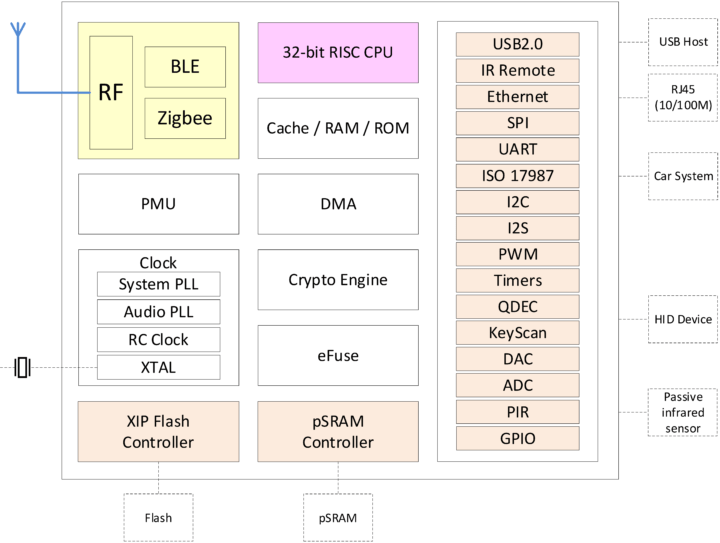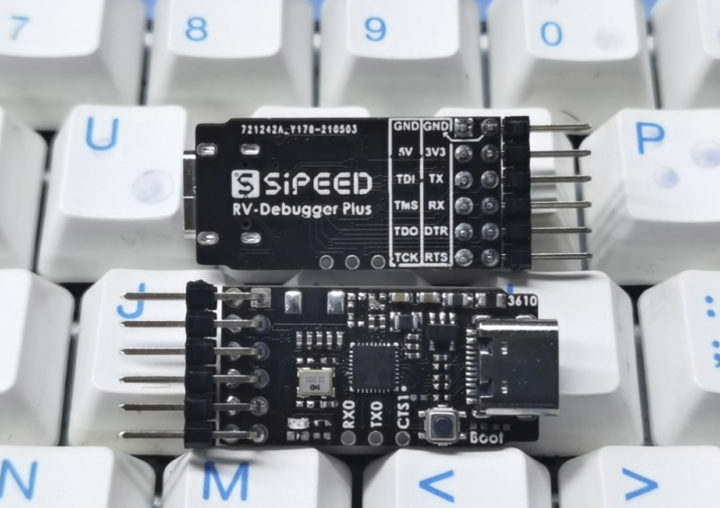USB to UART debug boards are a necessity for anyone playing with single board computers, at least when using bleeding-edge bootloader or Linux kernel where the target board may not always boot, or when troubleshooting booting problems.
Those are often based on FDTI or WCH chips, but Sipeed RV-Debugger Plus features Bouffalo Lab BL702 Zigbee & Bluetooth LE RISC-V SoC instead and offers both UART and JTAG interfaces. So let’s have a look at both the board and SoC.
Sipeed RV-Debugger Plus
USB to TLL debug boards are meant to be simple and that’s the case for Sipeed latest BL702 board as it comes with a 12-pin connector with Tx/Rx for UART, 8 signals for JTAG, plus 5V, 3.3V, and GND power signals. We can also see pads for Tx/Rx/CTS, a boot button, a crystal oscillator, and a USB-C port to connect to the host computer.
What I don’t see is an antenna to use of Zigbee and/or Bluetooth LE connectivity, so I asked on the Twitter thread where Sipeed showcased the prototype, and that’s the company answer:
There is the antenna pad upon the osc. it is reserved, as there is no much space for RF clearance.
So it may not be the best board to play with Zigbee/BLE. Sipeed says it will soon be sold for around $3 on Aliexpress and Seeed Studio.
Bouffalo BL702 Zigbee/BLE SoC

BL702, BL704, and BL706 key features and specifications:
- MCU Core – 32-bit RISC-V Core with FPU up to 144 MHz
- Memory – 132KB RAM
- Storage – 192KB ROM, 1Kbit eFuse
- External Memory/Storage – Support for XIP pSRAM and QSPI flash
- Connectivity
- Ethernet RMII interface
- Bluetooth 5.0 Low Energy up to 2 Mbps, Long Range 500/125Kbps
- Zigbee 3.0 / IEEE 802.15.4
- Support Wi-Fi/Bluetooth/Zigbee coexistence
- 2.4 GHz RF transceiver with integrated RF balun, PA/LNA
- USB – 1x USB 2.0 FS device interface
- Other I/Os
- SPI master/slave, 2x UART (Support ISO 17987), I2C master
- Audio – I2S master/slave
- 5x PWM channels
- Quadrature decoder
- Key-Scan interface
- 12-bit general ADC, 10-bit general DAC
- PIR (Passive Infra-Red) detection
- 15 (BL702) or 23 (BL704) or 31 (BL706) GPIOs
- IR remote control interface
- Security
- Secure boot, secure debug
- XIP QSPI On-The-Fly AES Decryption (OTFAD)
- AES 128/192/256, MD5, SHA-1/224/256
- TRNG (True Random Number Generator)
- PKA (Public Key Accelerator)
- Clocks – Support XTAL 32MHz, XTAL 32/32.768KHz; Internal RC 32KHz & 32MHz oscillator; internal system PLL & audio PLL
- Debugging – JTAG
- Power Modes – Off; Hibernate (RTC/GPIO wakeup); Power Down Sleep (Flexible retention); Active
- Package Type
- QFN32 (BL702)
- QFN40 (BL704)
- QFN48 (BL706)
The only difference between BL702 and its larger siblings, BL704 and BL706, only seems to be the number of GPIOs. The chips are designed for low-power IoT applications, BLE devices, Zigbee devices, Smart Home applications, and remote controls.
Availability and documentation
RV-Debugger Plus board is available on Aliexpress for $3.49 plus shipping. You’ll find the documentation and source code (C SDK) on Github. The board can be used as a JTAG+UART board or a dual UART board although support for the latter is on a TODO list. More information about the BL720 chip itself could eventually surface on the product page on Bouffalo Lab website.
[Update: The post was initially published on May 28, 2021, and updated on June 21 as the board became available on Aliexpress, and source code and documentation released]

Jean-Luc started CNX Software in 2010 as a part-time endeavor, before quitting his job as a software engineering manager, and starting to write daily news, and reviews full time later in 2011.
Support CNX Software! Donate via cryptocurrencies, become a Patron on Patreon, or purchase goods on Amazon or Aliexpress





